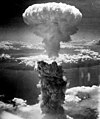The Nuclear Technology Portal
Introduction

- Nuclear technology is technology that involves the nuclear reactions of atomic nuclei. Among the notable nuclear technologies are nuclear reactors, nuclear medicine and nuclear weapons. It is also used, among other things, in smoke detectors and gun sights. (Full article...)
- Nuclear power is the use of nuclear reactions to produce electricity. Nuclear power can be obtained from nuclear fission, nuclear decay and nuclear fusion reactions. Presently, the vast majority of electricity from nuclear power is produced by nuclear fission of uranium and plutonium in nuclear power plants. Nuclear decay processes are used in niche applications such as radioisotope thermoelectric generators in some space probes such as Voyager 2. Generating electricity from fusion power remains the focus of international research. (Full article...)
- A nuclear weapon is an explosive device that derives its destructive force from nuclear reactions, either fission (fission bomb) or a combination of fission and fusion reactions (thermonuclear bomb), producing a nuclear explosion. Both bomb types release large quantities of energy from relatively small amounts of matter. (Full article...)
General images -
Selected article -
The Quebec Agreement stipulated that the US and UK would pool their resources to develop nuclear weapons, and that neither country would use them against the other, or against other countries without mutual consent, or pass information about them to other countries. It also gave the United States a veto over post-war British commercial or industrial uses of nuclear energy. The agreement merged the British Tube Alloys project with the American Manhattan Project, and created the Combined Policy Committee to control the joint project. Although Canada was not a signatory, the Agreement provided for a Canadian representative on the Combined Policy Committee in view of Canada's contribution to the effort.
British scientists performed important work as part of the British contribution to the Manhattan Project, and in July 1945 British permission required by the agreement was given for the use of nuclear weapons against Japan. The September 1944 Hyde Park Aide-Mémoire extended Anglo-American co-operation into the post-war period, but after the war ended, American enthusiasm for the alliance with Britain waned. The McMahon Act (1946) ended technical co-operation through its control of "restricted data". On 7 January 1948, the Quebec Agreement was superseded by a modus vivendi, an agreement which allowed for limited sharing of technical information between the United States, Britain and Canada. (Full article...)
Selected picture -
Did you know?
- ... that the sodium fast reactor Fermi 1 suffered a nuclear meltdown that led one operator to suggest "we almost lost Detroit"?
- ... that under college president Arthur Bronwell in 1959, Worcester Polytechnic Institute built one of the first nuclear research reactors at an American university?
- ... that before becoming a successful children's author, Myron Levoy was an engineer doing research on nuclear-powered spaceships for a mission to Mars?
- ... that campaigning by climate activist Kimiko Hirata halted plans to build 17 new coal-fired power plants following the Fukushima nuclear disaster in Japan?
- ... that coral cores from Flinders Reef capture environmental changes caused by the use of nuclear weapons?
- ... that Helen Steven shared the Gandhi International Peace Award for her opposition to the nuclear submarine base in Scotland?
Related WikiProjects
Things you can do
| Parts of this portal (those related to section) need to be updated. Please help update this portal to reflect recent events or newly available information. Relevant discussion may be found on the talk page. (September 2021) |
Selected biography -
Warren was commissioned as a colonel in the United States Army Medical Corps in 1943 and appointed Chief of the Medical Section of the Manhattan Engineering District. He was responsible for the health and safety of the thousands of personnel involved in the Manhattan Project. He was present at the Trinity nuclear test in Alamogordo, New Mexico, where he was responsible for the safety aspects of the detonation of the world's first nuclear weapon. He led a survey team from the Manhattan Project to assess the effects of the atomic bombings of Hiroshima and Nagasaki. In 1946 he was Chief of the Radiological Safety Section of the Joint Task Force for Operation Crossroads, the nuclear test at Bikini Atoll.
In 1947 Warren became the first dean of the School of Medicine at the University of California, Los Angeles (UCLA). Under his leadership, the new school grew from nothing to a major medical school. Although controversial and opposed by James Bryant Conant, Warren would speak out about the dangers of nuclear fallout from weapons testing from about 1947 onwards and upon the Castle Bravo test in 1954 his views were lent some credence, which informed opinion leading up to the Partial Nuclear Test Ban Treaty. Warren became Vice Chancellor, Health Services in 1962 at UCLA. From 1963 to 1965 he served as special assistant to President John F. Kennedy and later Lyndon B. Johnson on mental retardation. Returning to UCLA in 1965, he became professor emeritus, a position he held until his death in 1981. In 1971, he was awarded the Enrico Fermi Award for his contributions to science and medicine. (Full article...)
Nuclear technology news
- 14 May 2024 –
- Russia places its nuclear capable submarine-launched Bulava intercontinental ballistic missile into service. (Reuters)
- 9 May 2024 – Joint Comprehensive Plan of Action, Iran–Israel relations
- Iran warns that it will build a nuclear weapon if Israel continues to target its nuclear facilities. (Al Jazeera)
Related portals
Related topics
Subcategories
Associated Wikimedia
The following Wikimedia Foundation sister projects provide more on this subject:
-
Commons
Free media repository -
Wikibooks
Free textbooks and manuals -
Wikidata
Free knowledge base -
Wikinews
Free-content news -
Wikiquote
Collection of quotations -
Wikisource
Free-content library -
Wikiversity
Free learning tools -
Wiktionary
Dictionary and thesaurus







































































































